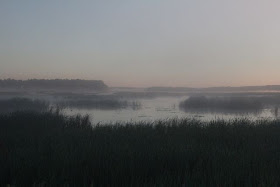 |
© harrington
|
Hi! Thanks for visiting. Several people whose opinions I respect have recently suggested that I seem to value "things" only because of their utilitarian qualities. I've been thing about that for some time now. I understand, I think, why they have made the assessment they have. Frequently, my primary response to something or someplace is "what can I do with this?" That question has a distinctly utilitarian flavor to it. When I learn the name of a wildflower, I'd also like to learn if it has, or has had, a function purpose in addition to its attractiveness. Some would call the area in the picture a swamp, and they would be accurate in many ways. But it serves more purposes (is) more than a swamp. At times like those pictured, I think it's beautiful, peaceful, calm, relaxing. At other times it provides: a place to hunt waterfowl; to go fishing; to store floodwaters; habitat for turtles; fish for osprey's; etc. Lots of uses that, the way I look at things, enhance its beauty. Reading poetry often makes me feel good; sometimes sad; sometimes happy; usually makes me think; sometimes makes me angry. Is poetry less appealing if it also serves some other purposes? Over the billions of years that nature has been evolving, the designs that have emerged often serve multiple purposes including being attractive, efficient and effective. Over the years that I've been working in environmental protection and sustainable development, I've learned that adding solutions to an existing process is rarely as effective or inexpensive as redesigning the process to eliminate the need for the added solution. Remember 3M's Pollution Prevention Pays? That slogan says prevention, not treatment or mitigation. It seems to me that we need to bring more of a similar perspective to the design of our buildings, neighborhoods and cities. What can an ecological perspective teach us about having a better world with less likelihood of destroying the support systems that we depend on for clean air, clean water, food, comfort and company? Should we think about starting with a land ethic, making us just another member of the land (biotic) community? Don't think of it as a step down for people. Think of it as a step forward in self preservation or think of it as you will after reading, but please, think of it.
Imaginary Countries: The Real World
By Michael Sharkey
In the real world
lovers part at morning with a kiss
and look back longingly
before they pass from sight.
They go insouciant to work
and smile at times;
their life’s Vivaldi.
Others bring what poetry they can into a life
by counting days
until employment comes again.
They look at cherries in the fruit store and imagine
biting in. They look so good.
Children break from singing in the drill hall,
burst outside to toss their frisbees in the park.
A boy plays Satie on the piano;
two Americans embrace
as traffic whispers up the drive.
They are embarking for the real world’s farthest shore.
In the real world
someone signs petitions
every moment, tidies other people’s trash
and greets another who is loved by someone else.
This is how the real world copes with being economics,
mathematics and ecology and botany
and waiting for the bus.
Costumed people earn their living slipping
from the real world to persuade us to buy moon-cakes,
supple skin and perfect hair.
We smile to see them aping us.
Gymnorhina tibicen swoops low and boasts her turf:
the children run and shout out, ‘Magpie’
while the bird recalls the day in mimic song;
order then restored, she dines alfresco on their scraps.
And while we watch Magritte’s sky turn El Greco,
roofs de Chirico beneath the plastic clouds,
a plane is pasted on a sudden patch of blue.
Thanks for listening. Come again when you can. Rants, raves and reflections served here daily.
No comments:
Post a Comment